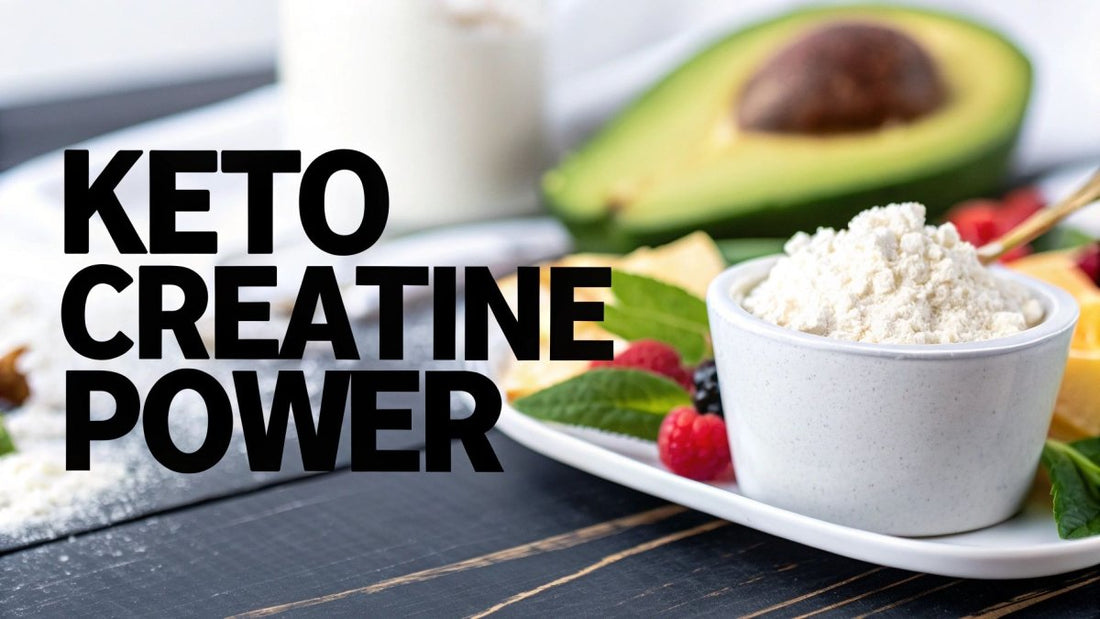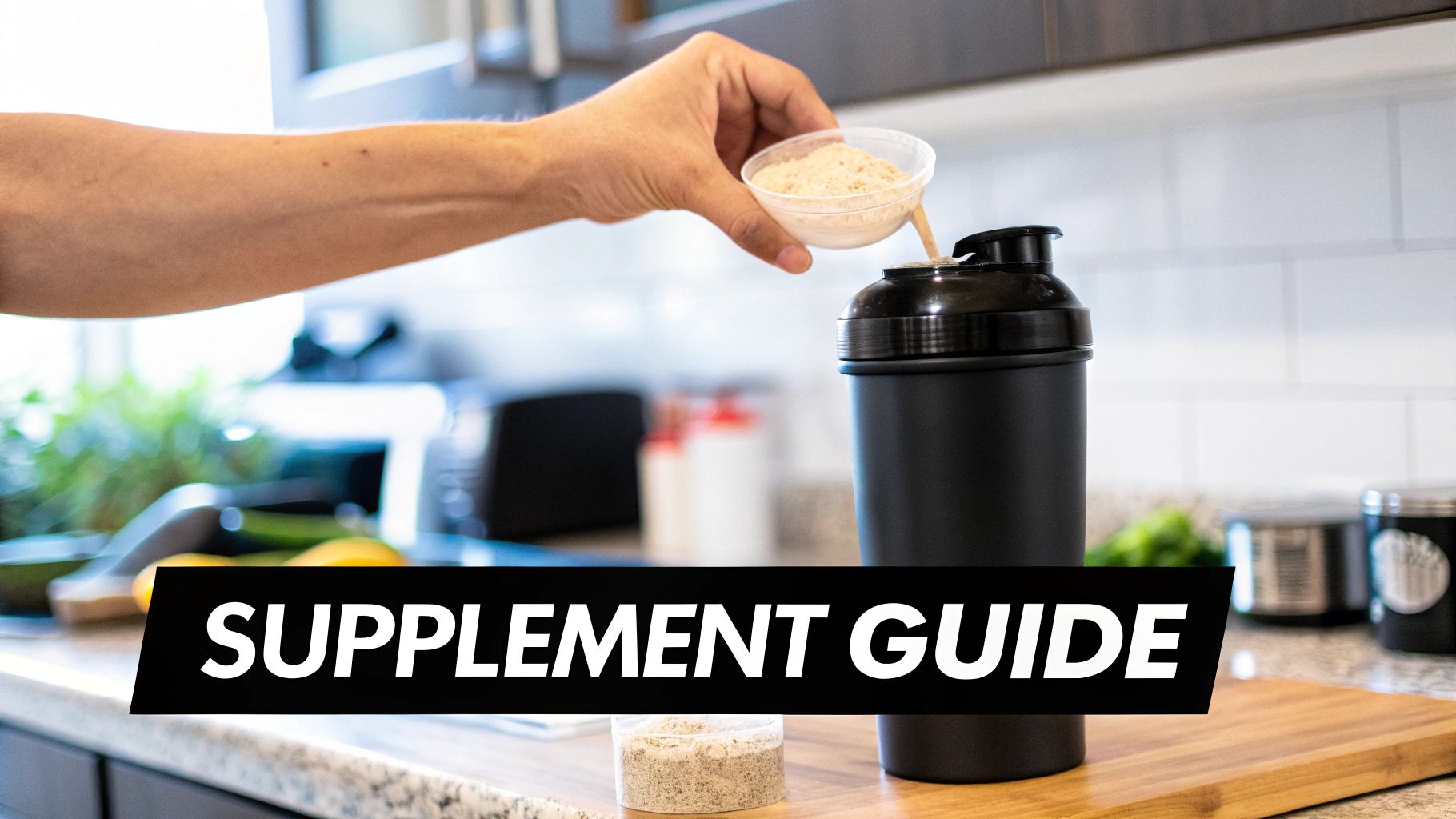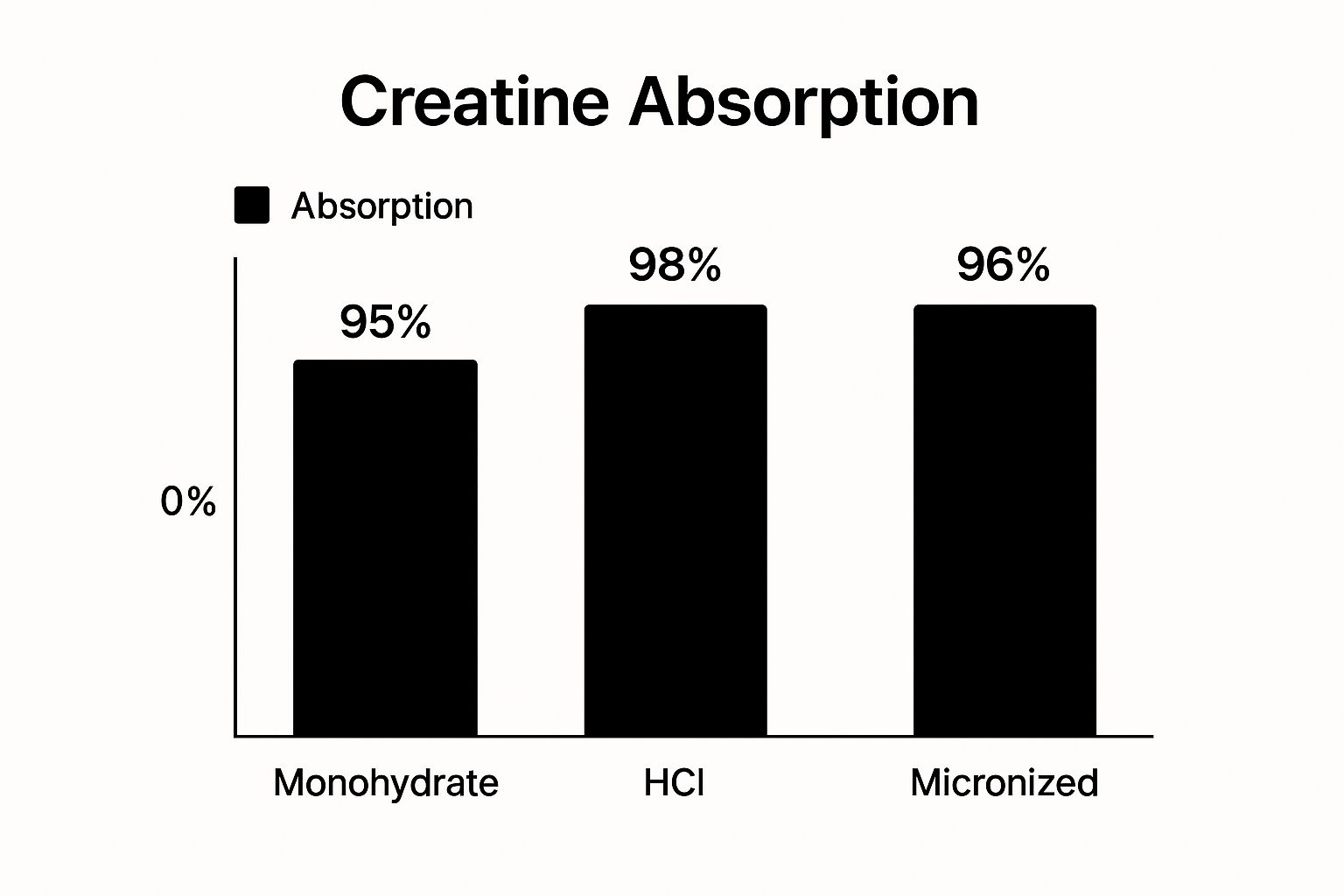
Creatine on Keto: Maximize Muscle Gain Safely
Share
Right, let's cut to the chase. The big question is: can you take creatine while on a keto diet? The answer is a resounding yes. In fact, if you care about your performance in the gym, you probably should be taking it.
Pairing creatine with a ketogenic lifestyle isn't just safe; it's a brilliant strategy to sidestep that initial performance slump many people hit when they first cut out carbs.
Why Creatine and Keto Are a Perfect Match
When you go keto, you're essentially teaching your body to run on fat instead of carbohydrates. This is a fantastic metabolic shift for fat loss and steady-state endurance, but it can leave you feeling a bit flat during those all-out, high-intensity efforts. Think heavy squats, deadlifts, or sprints.
That's because your muscles' quick-access energy tanks—your glycogen stores—are running on low without carbs. Your body on keto is like an elite marathon runner: incredibly efficient over the long haul but without that explosive burst of speed right off the starting line.
This is exactly where creatine steps in to save the day. It provides a completely separate, non-carbohydrate energy system for your muscles to tap into.
Creatine works by rapidly regenerating your muscles' most basic fuel, a molecule called ATP (adenosine triphosphate). This is the raw energy your muscles burn for short, powerful contractions, directly filling the gap left by the lack of quick glucose.
This powerful duo means you don't have to choose. You get the incredible fat-burning advantages of ketosis and the strength-building power of creatine. It’s a combination that works together to help you:
- Keep Your Strength: It helps you continue to lift heavy and push your limits, even without a carb-heavy pre-workout meal.
- Protect Your Muscle: Especially when you're in a calorie deficit to lose fat, creatine helps signal your body to hold onto precious lean muscle.
- Boost Muscle Fullness: Keto can sometimes lead to a "flat" look as your body sheds water. Creatine counters this by drawing water into the muscle cells, giving them a fuller, more hydrated appearance.
Let's break down how these two powerhouses complement each other.
How Creatine and Keto Work Together
Here's a simple table summarizing how creatine supplementation perfectly complements the metabolic state of a ketogenic diet, helping you maximize both fat loss and performance.
| Aspect | Keto Diet Effect | Creatine's Role | Combined Benefit |
|---|---|---|---|
| Energy for Power | Reduces muscle glycogen, potentially lowering explosive power. | Provides a non-carb, rapid energy source (ATP) for muscles. | Maintains and improves strength and anaerobic performance. |
| Muscle Mass | Excellent for fat loss, but catabolism is a risk in a deficit. | Signals muscle growth and helps preserve lean tissue. | Protects and builds muscle while you get leaner. |
| Cellular Hydration | Can cause initial water loss and muscle "flattening." | Pulls water into muscle cells, increasing their volume. | Promotes better muscle hydration and a fuller appearance. |
Ultimately, combining creatine with your keto plan allows you to train harder, recover better, and hold onto more muscle as you lean out. It's one of the most effective and well-researched ways to ensure your performance doesn't take a backseat to your diet.
How Creatine Fuels Your Body Without Carbs

To really get how creatine on keto is such a game-changer, let's use an analogy. Think of your body's energy system like a hybrid car. Normally, carbs are like the electric motor—they give you that instant, powerful jolt for quick acceleration, like smashing a heavy lift or going for an all-out sprint. Fat, in this analogy, is the gas engine—super efficient for long, steady drives, fueling your day-to-day, lower-intensity activities.
When you switch to a ketogenic diet, you're essentially taking that fast-charging electric motor offline by cutting out carbs. Your body gets incredibly good at running on its "gasoline" (fat) for fuel, but you might notice that your top-end power isn't quite there. This is that classic performance dip many people feel on keto; endurance feels endless, but explosive strength takes a hit.
The Role of ATP: Your Body's True Energy Currency
This is exactly where creatine steps in. It's like adding a super-capacitor to your system, giving your muscles an immediate power reserve. To see why, we need to talk about your body's most fundamental fuel source: a molecule called Adenosine Triphosphate (ATP). ATP is the raw energy currency for everything your cells do, but here's the catch: you only have a tiny amount stored up, just enough for a few seconds of intense, max-effort work.
Imagine you're in the middle of a heavy set of squats. Your muscles tear through their available ATP almost instantly. If you were eating carbs, your body would quickly break down glucose to replenish it. On keto, that pathway is mostly closed for business.
Creatine’s job is to rapidly recycle and replenish ATP. It donates a phosphate molecule to the used-up form of ATP (ADP), instantly converting it back into usable energy. This happens so fast that it directly fuels your muscles for those crucial first 5-10 seconds of maximum effort, completely bypassing the need for carbohydrates.
This rapid-fire recycling is what makes creatine the perfect partner for a ketogenic lifestyle. It directly fills the performance gap left by having low glycogen stores, letting you keep your strength and power without touching a single carb.
Keeping Your Strength Online
By making sure this immediate energy pathway is firing on all cylinders, creatine directly fights the potential downsides of keto for anyone serious about strength. It allows you to keep training with the intensity needed to build and maintain muscle.
Here’s a quick breakdown of how this carb-free fuel system works for you:
- Direct ATP Regeneration: It provides the raw materials to instantly remake your muscles' primary fuel.
- Bypasses Glycogen: Its energy cycle is completely independent of your carbohydrate stores.
- Sustains Explosive Power: It fuels those repeated bursts of strength you need during tough workouts.
In the end, creatine acts as a personal power grid for your muscles, keeping the lights on for heavy lifting and intense exercise. It ensures that going keto doesn't mean sacrificing your hard-earned strength, making the combination of creatine on keto a powerful formula for peak performance.
Real Performance Benefits of Creatine and Keto

Alright, let's move past the science and talk about what actually happens in the gym when you combine creatine and keto. The results are real, and you can feel them. While keto is fantastic for endurance and burning fat, it can sometimes leave you feeling a bit flat when it comes to raw, explosive power. This is precisely where creatine steps in, filling that gap and delivering tangible improvements to your training.
The first thing most people notice is that their strength holds steady, or even climbs. Creatine makes sure your muscles have that quick-burst ATP energy on tap for heavy lifts, even when your carb-fueled glycogen stores are low. This means you can keep pushing heavy weight and stimulating muscle growth, side-stepping that frustrating strength dip some people hit when they first go keto.
Boosting Anaerobic Power and Protecting Muscle
Think about the core of most training programs: weightlifting, HIIT, sprints. They all rely on repeated bursts of intense effort. Creatine is your best friend here. It acts as an energy reserve for this exact type of work, helping you squeeze out those last few, growth-triggering reps or finish a sprint interval just as strong as you started. Better workouts mean better, faster results. Simple as that.
Perhaps one of its most critical roles, especially if you're using keto to get lean, is how it protects your muscle. Cutting calories on any diet can put you at risk of losing some hard-earned muscle along with the fat. Creatine is famous for its anti-catabolic effect; it essentially tells your body to leave your muscle tissue alone and burn fat for fuel instead. You get leaner without sacrificing your strength.
Enhanced Muscle Hydration and Volume
Anyone who's been on keto for a while knows about the "whoosh" effect—you drop a lot of water weight initially. While great for the scale, it can leave your muscles looking a bit deflated. Creatine flips this script beautifully by pulling water into your muscle cells, a process called cellular hydration.
This intracellular water retention is a powerful sign that creatine is working. It not only gives your muscles a fuller, more pumped look but also creates an optimal environment for protein synthesis and growth.
This improved hydration is a game-changer for both how you look and how you perform on keto. What's more, studies have shown that during that initial keto-adaptation phase, when your body is still figuring things out and energy might lag, creatine helps support your muscle's energy systems. This is huge, as low glycogen on keto could otherwise put a damper on your anaerobic performance.
To explore further articles and resources on maximizing your athletic performance and understanding various supplement impacts, consider visiting the Titan Edge Titanium Blog for more insights on fitness and performance. And these benefits aren't just for men; we also have a comprehensive guide on the creatine benefits for women.
Your Dosing and Timing Protocol for Creatine on Keto

Alright, you get why creatine and keto are a powerful duo. Now for the fun part: how do you actually put it into practice? The great news is that the protocol for using creatine on keto is refreshingly simple, much more so than the old-school methods you might have heard about.
Let's clear something up right away: you can forget about the traditional "loading phase." That old advice involved taking massive doses of 20-25 grams of creatine for 5-7 days to quickly top off your muscles. But here's the catch—it was always recommended with a ton of carbs to spike insulin and shuttle the creatine into your cells. On a keto diet, that's both unnecessary and works against what you're trying to achieve.
The Best Dosing Strategy for Keto
The most effective, no-fuss approach is to stick with a consistent, daily maintenance dose. That’s it. Just take 3-5 grams of creatine monohydrate every single day, and yes, that includes your rest days.
This steady-and-slow method ensures your muscles will become fully saturated in about two to three weeks. You get all the performance-boosting benefits without any complicated schedules or the risk of stomach issues that can come with those mega-doses. It’s a true "set it and forget it" strategy that aligns perfectly with the consistency required for a successful ketogenic lifestyle.
If you want to dive deeper into the nuances of dosing, we've got you covered in our complete creatine dosage guide from beginner to expert.
When Is the Best Time to Take Creatine?
While consistency beats everything else, timing can give you a slight edge. Many experienced lifters swear by taking their creatine post-workout. The logic is solid: after you've pushed your muscles hard, they are primed to soak up nutrients, potentially improving absorption.
But don't get too hung up on this. Seriously. The most important thing is simply taking it. If you forget the post-workout window, don't sweat it. Whether it's in your morning coffee, mixed with a meal, or right before bed, the real magic happens by keeping your muscle creatine stores full, day in and day out.
The Non-Negotiable Rule: Stay Hydrated This is one thing you absolutely cannot ignore. Both the keto diet and creatine supplementation can have a diuretic effect, meaning they make your body flush out more water and electrolytes. Combining them makes proper hydration absolutely critical. You need to consciously drink more water than you usually would to support creatine’s function and avoid side effects like muscle cramps. Think of it this way: creatine pulls water into your muscle cells to do its job. If you’re dehydrated, you’re short-circuiting the whole process and leaving performance on the table.
Choosing the Right Keto-Friendly Creatine
When you're deep into a ketogenic lifestyle, you know that every single ingredient matters. Strolling down the supplement aisle can feel overwhelming, with a sea of creatine tubs all shouting about their superior results. But for those of us combining creatine on keto, the choice is actually refreshingly simple. It all boils down to one thing: purity.
Let's be honest, not all creatine is made equal. A lot of products, especially the brightly colored, flavored ones, are loaded with junk that will derail your diet in a heartbeat. "Mass gainer" blends and pre-mixed drinks are notorious for this, often packed with sugar, maltodextrin, and other high-carb fillers. These ingredients are designed to spike insulin and improve taste, but on keto, they're the fastest way to get kicked out of ketosis.
Why Monohydrate Is Your Best Bet
This is exactly why pure creatine monohydrate stands out as the undisputed champ for anyone on a ketogenic diet. It's the most studied form of creatine in the world, backed by hundreds of studies confirming its safety and effectiveness. More importantly, it has zero carbs, zero sugars, and zero calories. It’s a perfect, clean fit for your macros.
You really don't need to get caught up in the hype of fancy, expensive alternatives. Creatine monohydrate is the gold standard for a reason—it works, and it's by far the most budget-friendly option. Your main task is to put on your detective hat and read the label. You're looking for a product that lists "creatine monohydrate" as the one and only ingredient.

As this image shows, while some other forms might claim slightly better absorption on paper, the real-world difference in performance is practically nonexistent. It's certainly not enough to justify the higher price tag, especially when you weigh it against monohydrate's proven power and value.
Ultimately, whether you choose a powder you mix yourself or a convenient gummy comes down to what you prefer. If you're weighing the pros and cons, our deep dive on creatine gummies vs. powder can help you decide.
To help you navigate the different types, here’s a quick comparison of the most common forms of creatine you'll find on the market.
Comparison of Common Creatine Types
| Creatine Type | Key Feature | Keto Suitability | Cost-Effectiveness |
|---|---|---|---|
| Creatine Monohydrate | Most researched, proven effective | Excellent. Pure forms have zero carbs. | High. The most affordable option. |
| Creatine HCL | Higher solubility in water | Good, but check for fillers | Low. Significantly more expensive. |
| Creatine Ethyl Ester | Claimed better absorption (disputed) | Good, but check for fillers | Low. More expensive than monohydrate. |
| Buffered Creatine | Higher pH, "less bloating" | Good, but check for fillers | Moderate. Pricier than monohydrate. |
As you can see, while other options exist, creatine monohydrate consistently comes out on top for its combination of effectiveness, keto-friendliness, and value. Stick with what's proven to get the results you're after.
Clearing Up the Confusion: Common Myths About Creatine and Keto
Whenever you dive into the world of supplements, you’re bound to run into a ton of noise and bad advice. This is especially true when you start combining things, like taking creatine on keto. A few stubborn myths tend to scare people off, preventing them from tapping into a serious performance advantage. Let's cut through the chatter and set the record straight.
The Kidney Health Scare
One of the biggest concerns you'll hear is about kidney health. It's a logical question—after all, both a high-protein diet and creatine are processed by the kidneys. But for anyone with healthy kidneys, this fear is almost entirely unfounded. The scientific community has looked at this extensively, and the consensus is solid: standard doses of creatine don't harm healthy kidneys.
The same goes for a well-planned ketogenic diet. Studies have consistently shown that keto is perfectly safe for kidney function. In fact, research following people on low-carb diets for up to a year found no significant negative impact on their kidney health. If you'd like to dig deeper, you can find more on these findings in recent clinical trials, which should offer some peace of mind.
What About "Bloat" and Weight Gain?
This is another huge one. People hear "creatine" and immediately think of unwanted bloating and fat gain. This is simply a misunderstanding of how creatine actually works. Yes, when you first start taking it, the number on the scale will probably tick up by a few pounds. But that's a good thing, not a sign you're gaining fat.
This initial jump in weight is from intramuscular water retention. Creatine literally pulls water into your muscle cells, making them more hydrated and volumized. This is exactly what you want! It creates an ideal environment for growth and gives your muscles that fuller, more "pumped" look. It’s performance-enhancing water weight, not the soft, subcutaneous bloat that sits under your skin.
Think of it like this: A dry sponge is flat and brittle. A hydrated sponge is full, pliable, and ready to work. Creatine does the same for your muscles, which is especially helpful on a keto diet that can sometimes have a natural diuretic effect.
Finally, some people get skeptical because there isn't 100 years of research on this specific combo. That's just a matter of timing. The ketogenic diet was originally developed for medical reasons long before creatine exploded onto the athletic scene in the 1990s. The targeted study of combining creatine on keto is a much newer—and very exciting—field in sports science. And so far, modern research keeps pointing to some powerful synergistic benefits.
Got Questions About Creatine on Keto? We Have Answers.
It’s completely normal to have a few questions when you're dialing in a specific approach like the ketogenic diet. Every little detail counts, right? Let's clear up some of the most common uncertainties about using creatine on keto so you can feel confident in your choices.
The big one on everyone's mind is usually about ketosis itself.
Will Creatine Kick Me Out of Ketosis?
Nope, not a chance—as long as you’re smart about the product you pick up. Pure creatine monohydrate is a zero-carb and zero-calorie compound. It doesn’t touch your blood sugar or insulin, which means it has absolutely no effect on your body's ketone production.
The only time you might run into trouble is with creatine products that are packed with sugary fillers. Some brands add things like maltodextrin to their flavored powders to make them taste better. Your best bet is to always flip the tub over and check the label. You're looking for one simple ingredient: creatine monohydrate.
Do I Need a Loading Phase on Keto?
Honestly, a loading phase is pretty pointless and might even work against you on a keto diet. That old-school method of taking 20-25 grams a day for a week was designed to work alongside a high-carb diet, using the resulting insulin spike to shuttle creatine into the muscles. On keto, that whole mechanism is off the table.
A simple, steady dose of 3-5 grams per day works just as well. Your muscles will get fully saturated within a few weeks, and it's a much more sustainable and keto-friendly way to go.
Plus, you'll skip the digestive issues that can sometimes come with those massive doses. It just makes more sense.
What Happens if I Stop Taking It?
If you decide to take a break from creatine, don't worry—there are no crazy side effects. Your muscle creatine levels will just gradually drift back down to their normal baseline over about three or four weeks.
You might feel a slight dip in your top-end strength and power during your workouts. The scale might also drop a few pounds, but that’s just the extra water your muscles were holding onto being released. It's simply your body returning to its natural state.
It's also fascinating when you think about the history here. Keto diets were first used medically way back in the early 1900s, while creatine didn't really explode in the fitness world until the 1990s. Because of this gap, most of the early keto research happened long before creatine was a common supplement. That’s why the science behind combining them is such a new and exciting area of study. You can discover more about the history of the ketogenic diet on Harvard.edu.
Ready to feel the difference a truly keto-friendly creatine can make? Smash.com delivers the full 5-gram daily dose in delicious, mess-free gummies with zero sugar. Upgrade your routine and smash your goals with Smash.com today.